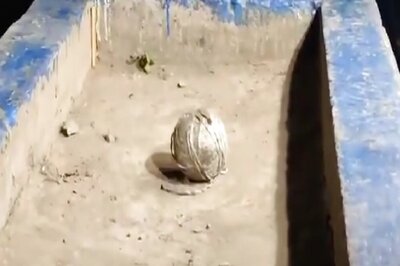
views
The Allahabad High Court recently granted bail to a man accused of allegedly pouring kerosene oil on his wife and setting her ablaze because she could not prepare food as there were no vegetables in the house.
A bench of Justice Shekhar Kumar Yadav observed that the main question, which arose for consideration was, whether the act of the accused would fall within the definition of ‘murder’ or it would be ‘culpable homicide not amounting to murder’.
The HC noted that the dying declaration of the deceased showed that when she could not prepare the food, the accused lost his temper and the alleged incident happened.
The court held, “It means that there was no premeditation for the applicant to commit such offence as alleged against him.”
The HC also took note of an admitted fact that the deceased was admitted to a hospital after the incident where she remained under treatment for eight days. During the course of treatment, the deceased developed septicemia, which was the main cause of her death.
“It is, therefore, established that during the aforesaid period of 8 days, the injuries aggravated and worsened, as a result, she died due to septic shock,” Court noted.
Moreover, the court referred to the decisions in Maniben vs. State of Gujarat (2009) and Chirra Shivraj vs. State of Andhra Pradesh (2010), wherein under similar set of facts of the case, the accused persons had been convicted under Section 304 Part II IPC.
Therefore, taking into consideration the overall facts and circumstances and arguments put forth in the matter along with the principles laid down by the courts in the above-referred case laws, the single judge bench opined that the present matter was a fit case for grant of bail.
The case was lodged in 2013 under Sections 498A, 302, 326, 323, 504, 506 of the Indian Penal Code (IPC) by the deceased woman’s father, who had alleged that though he had given sufficient dowry in his daughter’s marriage, her in-laws were not happy with the same and they used to torture and harass his daughter.
He had claimed that after getting the information that his daughter had been burnt, when he reached the hospital and found his daughter struggling for her life, he had asked her about the incident and she had told him that she had been set ablaze by her husband, sister-in-law, brother-in-law, mother-in-law and father-in-law by pouring kerosene on her.
However, in the present bail plea, the accused husband’s counsel argued that even if it was assumed that the accused had committed the offence as alleged in the FIR as well as the dying declaration of the deceased, no offence under Section 302 of the IPC was made out against the accused.
He had contended that even in her dying declaration, the deceased had mentioned that the alleged incident happened as she could not prepare food, therefore, the present case could travel up to the limits of offence under Section 304 Part II of IPC for which the maximum punishment is 10 years imprisonment and the accused had already served more than 9.5 years in jail.
Read all the Latest India News here




















Comments
0 comment